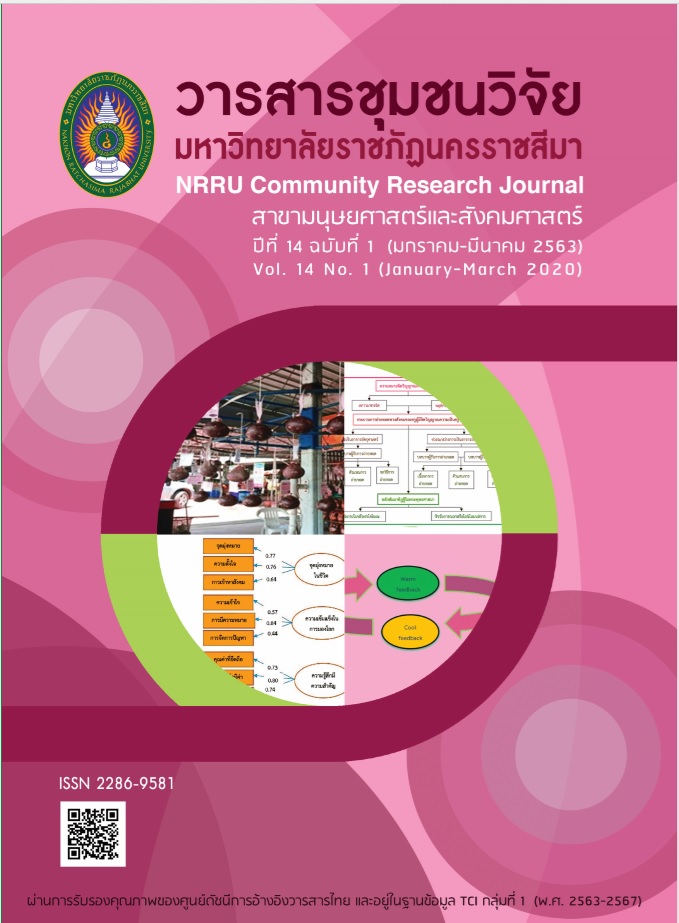รูปแบบการจัดการโซ่อุปทานวิสาหกิจชุมชนกลุ่มสินค้าเกษตรอย่างยั่งยืน
DOI:
https://doi.org/10.14456/nrru-rdi.2020.11คำสำคัญ:
การจัดการโซ่อุปทาน, วิสาหกิจชุมชน, กลุ่มสินค้าการเกษตรบทคัดย่อ
งานวิจัยมีวัตถุประสงค์เพื่อศึกษาตัวแบบความสัมพันธ์เชิงสาเหตุของผลการดำเนินงานและรูปแบบการจัดการโซ่อุปทานวิสาหกิจชุมชนกลุ่มสินค้าเกษตรอย่างยั่งยืน เพื่อนำเสนอแนวทางให้ผู้ประกอบการวิสาหกิจชุมชนสำหรับกลุ่มสินค้าเกษตร ประชากรที่ใช้ในการวิจัยครั้งนี้ได้แก่ ผู้ประกอบการวิสาหกิจชุมชนในประเทศไทย จำนวน 1,447,678 ราย โดยกลุ่มตัวอย่างที่ใช้ในการวิจัยครั้งนี้คือผู้ประกอบการกลุ่มวิสาหกิจชุมชนในจังหวัดสุพรรณบุรี 10 อำเภอ 369 แห่ง รวมสมาชิก 6,167 ราย โดยกำหนดขนาดกลุ่มตัวอย่าง 384 คน สำหรับงานวิจัยเชิงคุณภาพเลือกผู้ให้ข้อมูลสำคัญได้แก่ ผู้ทรงคุณวุฒิ ผู้ดูแลกลุ่มวิสาหกิจชุมชน และประธานกลุ่มหรือตัวแทนของกลุ่มผู้ประกอบการสินค้าเกษตรของกลุ่มวิสาหกิจชุมชน ซึ่งแบ่งเป็น 3 ระดับ ระดับละ 4 คน ได้แก่ ระดับดี ระดับปานกลาง และระดับปรับปรุง และลูกค้าของกลุ่มสินค้าเกษตร 10 คน เครื่องมือในการวิจัยสำหรับเก็บรวบรวมข้อมูลได้แก่แบบสัมภาษณ์และแบบสอบถาม จากนั้นนำข้อมูลมาวิเคราะห์เนื้อหาด้วยการสุ่มแบบแบ่งชั้นภูมิและใช้แบบสอบถามที่มีค่าความเชื่อมั่นทั้งฉบับเท่ากับ 0.80 แล้วนำมาวิเคราะห์หาความสัมพันธ์ หาค่าสัมประสิทธิ์สหสัมพันธ์แบบเพียร์สัน และทดสอบสมมติฐานโดยใช้เทคนิคทางสถิติของโมเดลสมการโครงสร้าง
ผลการวิจัยเชิงปริมาณพบว่า การจัดการโซ่อุปทานผ่านความสำเร็จของวิสาหกิจชุมชน มีค่าสัมประสิทธิ์มากที่สุด (µ=0.98) ประสิทธิภาพการดำเนินงานมีอิทธิพลต่อผลการดำเนินงาน อย่างมีนัยสำคัญทางสถิติที่ระดับ 0.05 และมีความสัมพันธ์กันเชิงบวก และยังพบอีกว่า การที่วิสาหกิจชุมชนสินค้าเกษตรจะประสบความสำเร็จและยั่งยืนได้นั้น วิสาหกิจชุมชนต้องมีการบริหารจัดการตั้งแต่เริ่มต้นในการจัดตั้งกลุ่มต้องมีความร่วมมือกันภายในผู้นำและสมาชิก ร่วมกันนำทุนทางวัฒนธรรมของในชุมชนและท้องถิ่นมาสร้างมูลค่าเพิ่มให้กับการผลิตสินค้าของกลุ่มรวมทั้งต้องได้รับความช่วยเหลือจากหน่วยงานที่กำกับดูแลและภาคเอกชนและมีการจัดการอย่างเป็นระบบตั้งแต่การวางแผนการจัดการโซ่อุปทานตั้งแต่การเริ่มต้นการผลิตสินค้าจนถึงการส่งมอบสินค้าที่ต้องมีการตอบสนองความต้องการของลูกค้า สิ่งสำคัญของกลุ่มวิสาหกิจชุมชนคือต้องสร้างให้ลูกค้าเกิดความไว้วางใจและเชื่อถือในคุณภาพของสินค้าของกลุ่ม รวมถึงการจัดการกลุ่มวิสาหกิจชุมชนสินค้าเกษตรอย่างยั่งยืนต้องมีการคำถึงสิ่งแวดล้อมของในชุมชน ช่วยการรักษาภาพลักษณ์ของชุมชน และกลุ่มต้องสามารถปรับการดำเนินการของกลุ่มได้ทันท่วงทีกับสภาพเศรษฐกิจและพฤติกรรมของลูกค้าที่เปลี่ยนแปลงตลอดเวลา
เอกสารอ้างอิง
Community Development Department Ministry of Interior. (2017). Guidelines for Establishing and Developing Occupational Group. Bangkok : Style Creative House. (In Thai)
Cronbach, L. J. (1990). Essentials of psychological testing (5th ed.). New York : Harper Collins Publishers.
Hair Jr., J. F., Anderson, R. E., Tatham, R. L., & Black, W. C. (1998). Multivariate Data Analysis (5th ed.). Upper Saddle River, NJ : Prentice Hall.
Inwang, K. & Sithongphim, W. (2008). The Management system development of small and medium enterprise with sufficiency economy philosophy. Funding research report of National Research Council of Thailand. Bangkok : National Research Council of Thailand. (In Thai)
Kanlayanamit, P. (2015). Sustainable development of the Nordic countries. Faculty of Political Science Law Kalasin University. (In Thai)
Kaplan, R. S., & Norton, D. P. (1992). “The Balanced Scorecard: Measures that Drive Performance, in: Harvard Business Review, January-February 1992.” Putting the balanced scorecard to work (1992).
Kotler, P. (2004). Marketing Management (11th ed.). New Jersey : Prentice Hall.
Likert, R. (1967). The Method of Constructing and Attitude Scale. New York : Wiley & Son.
Office of the Prime Minister. (2016). Announcement of National Economic and Social Development Plan Part 12(A.D. 2017-2021). Bangkok : Office of the National Economic and Social Development Board. (In Thai)
Phuaphongsakon, N., et al. (2010). Study of guidelines for supply chain management and logistics of agricultural products. Thailand Development Research Institute. Bangkok. (In Thai)
Porter, M. E. (1985). Competitive Advantage. New York : The Free Press.
Prasitratsin, S. (2012). Research Methodology in Science. Bangkok : Samlada. (In Thai)
Royal Thai Government Gazette. (2019). National Strategy is a national development (2018-2037). Book 135 Part 82 A. 13 October 2019. (In Thai)
Schumacher, R. E., & Lomax, R. G. (1996). A Beginner’s Guide to Structural Equation Modeling. New Jersey: Lawrence Erlbaum Associates.





